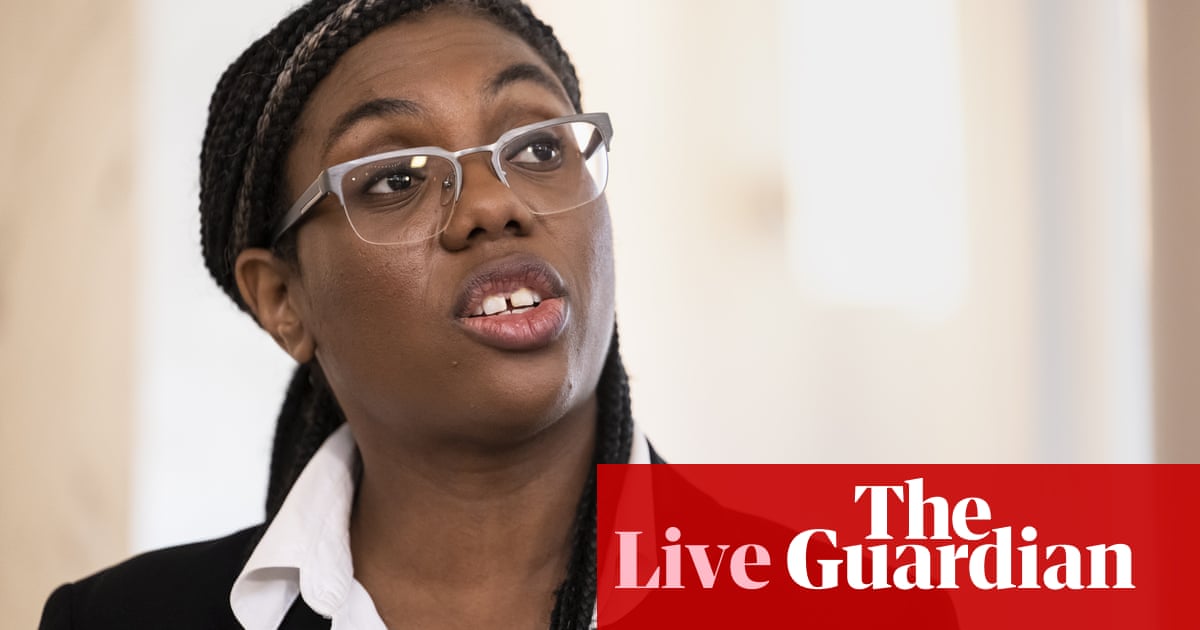
Badenoch claims problem raised by UK carmarkers worried about tariffs "isn"t to do with Brexit"
Kemi Badenoch, the business and trade secretary, has said that the problem raised by car manufacturers worried about exports to the EU facing tariffs from next year “isn’t to do with Brexit”.
She made the comment during business questions in the Commons, where Jonathan Reynolds, her Labour shadow, criticised her record since she has been in post. He told MPs:
It’s now been 100 days since we first welcomed [her] to her new post. In that time we’ve seen steel production fall to record lows, the automotive sector has issued warning cry after warning cry that government policy risks shipping jobs overseas.
Badenoch defended her record, saying she had negotiated for the UK to join the CPTPP, “the biggest free trade agreement that the UK has seen since we left the European Union”.
And on the car industry, she said:
The issue that the automotive industries are talking about is around rules of origin. This is something that the EU are also worried about because the costs of the components have risen.
This isn’t to do with Brexit, this is to do with supply chain issues following the pandemic and the war in Russia and Ukraine.
I actually have had meetings with my EU trade counterpart, we are discussing these things and looking at how we can review them, especially as the TCA [trade and cooperation agreement – the UK’s Brexit deal with the EU] will be coming into review soon.
The “rules of origin” requirements raised by car manufacturers are part of the TCA, and are therefore definitely related to Brexit. But Badenoch is right in the sense that all European car manufacturers are having problems because there is not enough battery supply in Europe, making them reliant on imports from Asia.
As a result, as the Financial Times reports, German carmakers who export to the UK are also calling for a delay in the introduction of TCA rules that, from next year, would impose tariffs on UK/EU vehicle imports with foreign batteries.
As the FT reports in its story:
The intervention is the belated fulfilment of Brexit advocates’ hope that German carmakers would step in to EU-UK negotiations to protect their own sales.
Afternoon summary
Kemi Badenoch, the business and trade secretary, has said that the problem raised by car manufacturers worried about exports to the EU facing tariffs from next year “isn’t to do with Brexit”. (See 12.15pm.)
The Labour party has pledged to introduce a Scottish-style right to roam law in England if it wins the next general election, with access to green space enshrined in law.
Rishi Sunak has stood by his leadership pledge to protect the green belt in England after the Labour leader, Keir Starmer, this week said it should be built on “where appropriate” to make housing more affordable.
Sunak has indicated that, although he remains committed to reducing the level of net migration, he no longer feels committed to reducing it below 226,000 a year – the target implied in the Conservative election manifesto of 2019. (See 9.36am.)
Voters in Northern Ireland have been casting ballots in a local election after a low-key campaign that became a proxy referendum on the region’s political stalemate.
UK and Norway agree security partnership to counter threats to critical undersea infrastructure
The UK and Norway have signed a security partnership to counter undersea threats and protect critical energy infrastructure in the wake of last year’s attack on the Nord Stream gas pipeline, PA Media reports.
PA says:
The two nations agreed to increase cooperation to improve their ability to detect submarines, counter mine threats and generally enhance North Atlantic security.
Ben Wallace, the defence secretary, and his Norwegian counterpart, Bjorn Arild Gram, signed a statement of intent during a visit to the Maritime Operations Centre on the Northwood military base today.
The UK and Norway have already jointly increased security patrols in the region where the unexplained Nord Stream pipeline explosions occurred. The blasts are subject to investigation but are believed to have been intentional.
Building on this, the agreement will bolster the development of capabilities to protect shared interests in the North Sea while streamlining the process for other allies to join their activity, according to the Ministry of Defence.
And Wallace said:
Cooperating through the JEF [Joint Expeditionary Force] and the Northern Group with our long-standing defence partner and Nato ally Norway, we are heightening our joint capabilities to protect western critical national infrastructure on the seabed.
The attack on the Nord Stream pipeline has determined even closer collaboration across our collective assets to detect and defend against subsea threats and ensure continued North Atlantic security.
Queen"s funeral and associated events cost government £162m, Treasury reveals
The government spent £161.7m on the funeral of the queen, her lying-in-state and associated events that took place during the period of national mourning, the Treasury has revealed.
John Glen, the chief secretary to the Treasury, confirmed the figure in a written ministerial statement. He said these were marginal costs – money spent in addition to what would have been spent at the time anyway. He said:
During this period, many hundreds of thousands of people came in person to pay their respects, at the lying at rest in Edinburgh, the lying-in-state in Westminster, as well as in London and Windsor for the state funeral on 19 September. Many more people also came out to support His Majesty The King and other members of the royal family as they travelled around the UK during this time.
The government’s priorities were that these events ran smoothly and with the appropriate level of dignity, while at all times ensuring the safety and security of the public.
The Home Office, which is in charge of policing, was the UK government department spending the most (£74m), followed by the culture department (£57m). Glen said the Treasury was providing additional funding to departments to cover their costs, and that the Scottish and Welsh governments, and the Northern Ireland Office, were getting their costs covered in full.
Here is the breakdown of costs in the written statement.
When Rishi Sunak met his Japanese counterpart, Fumio Kishida, he was wearing socks showing the name of Kishida’s favourite baseball team, Hiroshima Toyo Carp. Ken Moriyasu from Nikkei Asia has the picture.
UK and Japan both "islands of innovation", Rishi Sunak tells his Japanese counterpart
Rishi Sunak has described the UK and Japan as “islands of innovation”. He made the comment when he met his Japanese counterpart, Fumio Kishida, in Hiroshima, according to the Downing Street readout. No 10 said:
The leaders welcomed the agreement of The Hiroshima Accord: An Enhanced UK-Japan Global Strategic Partnership as a landmark moment in our thriving diplomatic, defence and economic relationship.
They agreed that the UK and Japan would continue to work together closely to protect a free and open international order, building on the global combat air programme and recent reciprocal access agreement.
The prime minister confirmed that the UK carrier strike group will deploy to the region again in 2025, working alongside the Japanese maritime defence forces. They also discussed further potential cooperation on training and exercising.
The prime minister described the UK and Japan as ‘islands of innovation’, as the leaders discussed the huge opportunities to grow bilateral trade and investment, as well as UK-Japan cooperation on semiconductors and clean energy technology like floating offshore wind.
No 10 also said that, on the G7, Sunak and Kishida both agreed “on the importance of the G7 having a unified approach on China” and that it should “continue to lead international work on holding Russia to account for its actions and supporting Ukraine to achieve a just and lasting peace”.
Yesterday Alister Jack, the Scottish secretary, said he was standing down at the next election. According to Freddie Hayward in his Morning Call briefing for the New Statesman, Jack is the 35th Tory MP to say they are standing down, meaning that 10% of the parliamentary party has now decided to quit the Commons. “Conservative MPs are delivering a vote of no confidence in their party by other means,” Hayward says.
Humza Yousaf defends minister accused of getting rail works postponed to benefit her constituency
Humza Yousaf had to defend one of his close colleagues at an angry session of FMQs this lunchtime after new claims that Jenny Gilruth broke the ministerial code by delaying vital rail works in order to suit constituents.
Reports in the Scottish Daily Mail suggest that Gilruth – then transport minister and now education secretary – persuaded Network Rail and ScotRail to postpone rail improvement works to avert festive disruption to her Fife constituents and that the decision has cost the taxpayer £1m, with the works not yet completed.
Scottish Conservative leader Douglas Ross said Gilruth should have recused herself from the decision “because of the clear potential for a conflict of interest”, adding this was a “clear cut sackable offence”.
Yousaf gave a somewhat muddled response, suggesting he would investigate the accusations but meantime considered the decision to postpone to be the right one.
Speaking to journalists after FMQs, he confirmed he would “look at the detail” but added:
From the information I have in front of me, it does not look like there has been a breach. I can see perfectly legitimate reasons why Jenny Gilruth made the decisions she made at the time.
Minister campaigning to be Tory candidate for London mayor says he would oppose plan for 20mph speed limits in capital
Paul Scully, the tech minister who is running to be the Conservative candidate for London mayor in the election next year, is campaigning on a proposal to get rid of plans to impose 20mph speed limits in the capital, Bloomberg’s Kitty Donaldson reports.
In London 20mph speed limits are increasingly being introduced on roads as part of a goal “to eliminate death and serious injury from London’s transport network by 2041”. Justin Welby, the archbishop of Canterbury, is one of the Londoners who has been penalised as a result. He was fined recently for driving 25mph in a 20mph zone.
Commons leader Penny Mordaunt declines to defend National Conservatism conference proceedings
Penny Mordaunt, the leader of the Commons, has declined to defend what happened at the National Conservatism conference in London this week.
The conference, organised by an American thinktank, involved cabinet ministers and Tory MPs participating alongside other speakers at an event where much of what was said went way beyond conventional conservatism, and instead veered towards far-right extremism.
Opposition MPs condemned the event in the Commons as Mordaunt took questions on the statement about next week’s business. Thangam Debbonaire, the shadow leader of the Commons, described it as the “Conservatives’ conspiracy Comic Con”.
And the SNP’s Deidre Brock said people would be “extremely concerned” about what was said at the conference. She told MPs:
The Holocaust was dismissed as Nazis mucking things up.
We were told that only married straight couples could safely bring up children, that pagans and narcissists are harming western civilisation, and that woke teachers are ruining children’s education. Should make for an interesting Tory manifesto.
Many of my constituents are extremely concerned by these latest developments. Can we have a debate to examine these extremist languages and attitudes that we’ve witnessed at these conferences?
And can [Mordaunt] tell us, do they further signal her government’s alarming slide into the grip of the far right? Or will she reject these ideas out of hand, like all decent people?
In response, Mordaunt said:
She asks me about the National [Conservatism] conference. This is not a conference that has been organised by government, or the Conservative party, and therefore not within my remit or responsibilities to respond to.
My colleague Peter Walker has a good summary of what happened at the conference here.
One person taking a close interest in what Kemi Badenoch says about Brexit (see 12.15pm) will be Lord Ashcroft, the billionaire former Tory deputy chairman. He has announced that he will publish a biography of her. He says:
Kemi Badenoch is one of the most interesting politicians to emerge in recent years in any party and she is likely to feature ever more prominently in the national consciousness. Her background growing up in Nigeria and America before coming to Britain as a teenager, together with her willingness to confront contentious issues, undoubtedly set her apart from most MPs in the House of Commons.
In recent years I have published biographies of David Cameron, Jacob Rees-Mogg and Sir Keir Starmer, and I’m putting the finishing touches to my updated book on Rishi Sunak. I have no doubt that Kemi Badenoch will prove just as rewarding a subject.
Badenoch may consider this a mixed blessing. Ashcroft has only published one biography containing highly damaging claims about its subject (the David Cameron one – Ashcroft had a grudge against Cameron, who reportedly reneged on a pledge to make him a minister), but none of his books are hagiographies, and Ashcroft is better able to fund research than journalists who normally write books about ambitious politicians.
However, this will be seen as confirmation that Badenoch is now a leading contender for the Tory leadership in future.
MPs will debate the strikes (minimum service levels) bill again in the Commons on Monday next week, Penny Mordaunt, leader of the Commons, told MPs in her business statement. The bill has finished its passage through the Lords, and MPs will be asked to remove various anti-government amendments passed by peers.
Sunak stands by pledge to protect green belt after Starmer housing comments
Rishi Sunak has stood by his leadership pledge to protect the green belt in England after the Labour leader, Keir Starmer, this week said it should be built on “where appropriate” to make housing more affordable, Rowena Mason reports from Hiroshima, where she is travelling with the PM.
No 10 welcomes apology from water companies over sewage spills, but says firms should put "consumers above profits"
Water companies in England have apologised for repeated sewage spills and pledged to invest £10bn this decade in an attempt to quell public anger over pollution in seas and rivers, Alex Lawson reports.
Downing Street has welcomed the announcement, while stressing that it will need to be approved by regulators. A No 10 spokesperson said:
We welcome this apology from the water industry, but acknowledge there continues to be more that needs to be done.
You’ll know that we put the strictest targets ever on water companies to reduce sewage pollution and demanded that water companies deliver their largest ever infrastructure investments of £56bn.
But the plans that have been set out today will of course need to go through the correct regulatory approval first to both ensure they deliver on the targets that we’ve set whilst not disproportionately affecting consumer bills.
Asked if the PM thought it was fair that customers of the water companies would have to pay for this investment, the spokesperson said:
We’ve been clear that we think water companies must put consumers above profits and we’ve said that previously, and we’ve taken steps to help drive progress and ensure they put consumers first.
And we’ve been clear throughout that we don’t want to see things disproportionately impacting customer bills, especially given we know that there are people up and down the country who are struggling with the cost of living, which is why we provided the help we have in that area.












